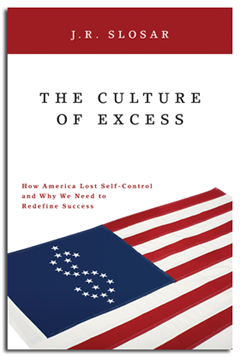Cultural Narcissism 2.0
Cultural Narcissism 2.0 includes the assimilation of technology, screen media, and extreme capitalism. The second version of cultural narcissism has far greater impact on our society than when it was first observed. Cultural narcissism is played out daily in the marketplace. The definition of success and making it is determined by the new culture. Entrepreneurial activity is a coveted goal. Deregulation is a core pathway to success. Economic policy represents Cultural Narcissism 2.0 and defines what success is. Cultural Narcissism 2.0 operates in an intensely fast and dynamic environment. It is in this incredible fast-paced culture that we define ourselves and define “success.” Yet success is attained by playing within a structure of marketplace mania.
Declining Self-Control & Impulsivity
The age of excess creates powerful forces that are gradually changing human development. The psychological damage caused by these forces is most evident in an impulsive society that has had a breakdown in self-control. This means that we take in more than we need, or engage in behavior without thinking it through, behavior that has undesirable consequences. Our boundaries for regulation and self control get stretched and even collapse, leading to rampant impulsivity.
Defining Success
The American culture of excess and wealth yields a paradoxical finding. And the data from research on happiness is clear. All of our materialistic and economic gains do not make us feel better. We lose ourselves for fun in activities like video games, extreme sports, spectator sports, and reality shows. But often these activities are pursued with obsessions that border on addiction. These trends of excess define our culture, altering the definitions of success, love, and happiness. But the new definitions are elusive. This is especially evident in what has been described today as “The Cheating Culture.” As such, the bar for the definition of cheating has been lowered. In fact, we are not even sure what cheating is anymore. Over 25 years, the changes I have observed in clinical practice, teaching, and consulting have led to the material in this book. The prospective that comes from my career in applied psychology adds an invaluable dimension to academic research and viewpoints.
Are You A Star?
Fast-moving and changing images of attainment, an ideal, success, and heroes contribute to the growth of the culture of excess. The overidealization of media figures and obsessions with their struggles and “recovery” are a part of the growth of cultural narcissism. In this case, there is more of a social narcissism to the processes — falling in love with the images of success. We crave and desire to be successful like the stars. We want to act, look, and dress like they do. The intensity and obsessiveness creates a huge entertainment financial empire that invites commercialism and the profit for entrepreneurial narcissism. In traditional sports, this increased commercialism can be excessive and harm the historical significance and attachment to the community and its identity. The development of identity for individuals growing up in their community is an important indicator for a healthy society. As individuals, teens and young adults must answer the question:”Who Am I?” The answer to this question of identity development is much harder today than ever before.
Thinking Within the Box
Social and cultural forces, including declining self-control, inflated sense of self, and competitive pressures, have impacted our thinking and cognitive development. Lower scores in math and science are a result. We have even reached the conclusion we are innately poor at math. The long-term impact on our society is tremendous. The number of students choosing engineering and math as a career has declined and employers lack an adequate talent pool for important technical jobs. Workers from other countries will perform the important and serious jobs that determine our country’s economic development and defense.
Science Sellout
Sources are established as experts to provide technical information and to protect us. The scientists and professionals have status, expertise, and countless years of dedicated training we trust and rely upon. But today, that knowledge and expertise are up for sale. Is it good data if the experts say it is? Today’s culture of narcissism devalues science. It uses science in manipulative ways for the entitlement of success through the pursuit of wealth. The lack of boundaries necessary to avoid a conflict of interest and evaluate data permeates all levels of society. The realization that experts cannot be trusted adds further to the negative response and anxiety about statistics and numbers. Worse yet, it leads to a disbelief in science.
Who am I?
We now carry with us the hyper-vigilance that someone will steal our personal information and history — a part of our self — and this is now just expected. We now struggle to develop our identity in a complex and overwhelming environment, and we struggle to protect it too. That takes a whole lot of energy. It makes us defensive. Identity attainment and achievement is complex in today’s technological society. Commitment and consistency prove difficult. The prevailing attitude about developing identity is that of going through a buffet line and picking what you want in whatever amount you want. The excess in our culture is not just with materialism but with our psychological self, our self-image, and our identity. What constitutes success needs to be redefined, by either a new generation or by cultural changes we must make collectively.
Commercialism and Community
Professional sports are a part of the explosive capitalism and narcissistic entrepreneurialism of today. The public does not challenge the huge player salaries as much as the inflated CEO salaries. This is true even though a player can be paid millions and have a terrible year and not perform well. The impact of the commercialism in destroying the experience of the reality of sports seems also to just be something we accept. Yet the deep roots and history of a team in a community have a powerful and positive psychological impact in helping people feel connected and having a sense of identity. If we have experiences that are satisfying, have real competition and develop positive attachments and connections to others — shouldn’t we try to preserve them?
“Jay Slosar gives us the benefit of his years of clinical and teaching experiences with people who reveal just how firmly we live in an age of excess. Wonderfully written, The Culture of Excess not only discusses how we got to this point, but offers insights on how to change course. Individuals, parents, decision-makers, and others will come to see how we might turn ‘Generation Me’ into ‘Generation We,’ and create a better world in the process. This is an important book.”





